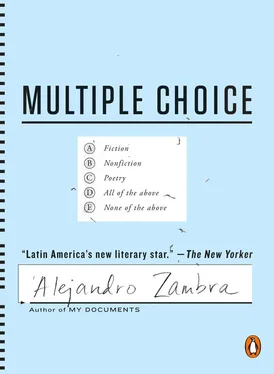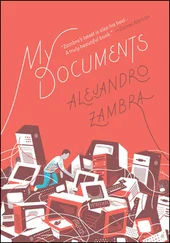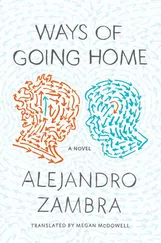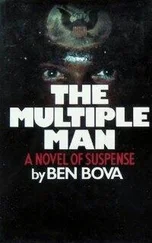(5) Your punishment was to stand face-to-face, staring into each other’s eyes and holding both hands, in the middle of the playground for the entire recess, while the other children yelled and teased you.
(6) She cried from the shame. You were on the verge of tears, but you kept your eyes on her face, you felt a kind of sad fire burning. Her name, the girl’s, was Rocío.
(7) How long was that recess? Ten minutes, maybe fifteen. You never again spent fifteen minutes looking into another person’s eyes.
(8) It would be easier to just embrace the stranger there in front of you. You are both looking down; you are taller than she is. You focus on her black, still-wet hair.
(9) The tangled strands of that long, straight hair: you think about the hair that you used to untangle, carefully, on certain mornings. You learned the technique. You know how to untangle the hair of another person.
(10) Now almost everyone has gotten off the elevator, and only she and you are left. With each new space that opens up, you take the opportunity to move apart. You could stand even farther apart, each of you clinging to your corner, but that would be demonstrating something. It would be the same as embracing.
(11) She gets off one floor before you. And it’s strange and somehow horrible that when you see your body multiplied in the mirrors you feel the immense relief that you feel now.
(12) “In Chile, no one says hello to each other in elevators,” you say that night, at a dinner with friends from abroad. “They don’t in my country, either,” everyone answers, maybe out of politeness. “No, really, in Chile no one says anything. People don’t even look at each other in elevators,” you insist.
(13) “Everyone fakes their absence. Old friends, enemies, or lovers could be in the same elevator and never know it.”
(14) You add generalizations about Chilean identity, rudimentary sociology. As you speak, you feel you are betraying something. You feel the sharp point, the weight of your imposture.
(15) “In Chile, no one says hi to each other in elevators,” you say again, like a refrain, at a dinner where everyone competes to be the best observer and to inhabit the worst country.
A) None
B) 4, 5, 6, and 7
C) 8 and 9
D) 3, 4, 5, 6, 7, 8, 9, 10, and 11
E) 1, 2, 3, 8, 9, 10, 11, 12, 13, 14, and 15
63.
(1) I was his friend, I was his pal. I knew him. And it’s not true what they say about him. Some things, sure, but not all of it. I care about what they say, it hurts. It’s as if they were talking about me.
(2) It’s true he thought fags were revolting, but he never fired anyone for being one. We all knew Salazar was batting for the other team — you only had to look at him. But he was lazy. My buddy fired him for being lazy, not for smoking pole.
(3) It isn’t true that he mistreated the maid. There was a reason she kept working in his house so long. He used a bell to call her; sometimes he said “please” when he asked her for things. And every Christmas he gave her a brand-new, spotless uniform. And in February he brought her to the house in Frutillar. The old lady got a one-month vacation, all expenses paid.
(4) And what is the problem, if I may ask, with the bell? Do you mean to tell me it’s better to call the maid by shouting at her?
(5) It’s true he didn’t like Mapuches, but it’s just that these days you have to respect everyone. I mean, come on, you can’t say anything — everything offends someone, and everyone’s a victim. And my buddy was consistent. He said what he thought and that was his only sin.
(6) And what’s the big deal with the Mapuches, anyway? They lost the war, same as the Peruvians. They lost, that’s it. The Bolivians, too — now they go around crying about how they don’t have access to the sea, yapping on and on about maps. They’re like little kids begging their parents for candy.
(7) Today you’ll find people saying they didn’t know about the disappearances, or the torture, or the murders. Of course they knew. My buddy knew, I knew, everyone did. How could we not? I remember years ago, we were in Rome, in a real swanky hotel, and this exiled guy comes over to us holding hands with a thin little redhead. I didn’t much like the guy — I thought he was pretty dense and uppity — but my buddy ended up making friends with him, and later on they did some business together.
(8) My friend didn’t discriminate against anyone. He could do business with any kind of person, he didn’t care about race or creed or anything political. He didn’t go around asking for favors. My buddy worked his whole life.
(9) Never, in forty-nine years of marriage, did he fool around on Tutú. He didn’t even fuck that secretary, Vania, who drove him crazy flashing her panties at him all the time. I remember he told me, pretty desperate, that if he went to bed with Vania he wouldn’t be able to look Father Carlos in the eye. Later we found out Father Carlos was a bigger lady-killer than any of us.
(10) I want to repeat this, because it goes to show the kind of moral stature my friend had: He never once fooled around on Tutú—he didn’t even go to whores. He just didn’t like them. To each his own, I guess.
(11) He didn’t just donate to Legionaries of Christ — I think my friend was like a drug addict with donations. He was always helping out his neighbors, the guy was just sick with solidarity. And at the end of the year, he gave every one of his employees a gift basket that was nothing to sneeze at.
(12) Whatever they may say of him, it’s easy enough to bad-mouth him now that he’s dead. But I would like you all to know that my friend isn’t all that dead, because he still has me, come what may. I’ll always defend him. Always, buddy — always.
A) None
B) All
C) 4
D) 9 and 10
E) 2, 3, 4, 5, 6, 7, 8, 9, 10, and 11
64.
(1) They ask my name and I answer: Manuel Contreras. They ask me if I am Manuel Contreras. I say yes. They ask if I’m Manuel Contreras’s son. I reply that I am Manuel Contreras.
(2) Once, I took the phone book and tore out the page with my name, our name. I counted twenty-two Manuel Contrerases in Santiago. I don’t know what I was looking for: company for my misery, maybe. But then I stuck the page into the paper shredder. Having common first and last names hasn’t done me any good.
(3) How does it feel to be the son of one of the biggest criminals in Chilean history? What do you feel when you think about your father, sentenced to more than three hundred years in jail? Can you sense the hate of the families your father destroyed?
(4) I can’t answer these questions, the ones people always ask. With rage, but also with genuine curiosity. I guess it makes people curious.
(5) It makes me curious too. What does it feel like not to be the son of one of the biggest criminals in Chile’s history? What does it feel like to think about how your father never killed anyone, never tortured anyone?
(6) I must say that my father is innocent. I should say it. I have to say it. I’m obliged to say it. My father will kill me if I don’t say he is innocent. The children of murderers cannot kill the father.
(7) I decided not to have children. I had my father to worry about. He’s sick. His declining health is a public matter; it’s been in all the papers.
(8) When my father dies, then I can have a life and a son. He’ll be Manuel Contreras’s son. But I won’t name him Manuel. I’ll tell his mother to pick a different name. I don’t want to be Manuel Contreras’s father.
(9) I’ve had enough just being Manuel Contreras’s son. I don’t want to be Manuel Contreras’s father too. Better yet, let it be a girl.
Читать дальше












